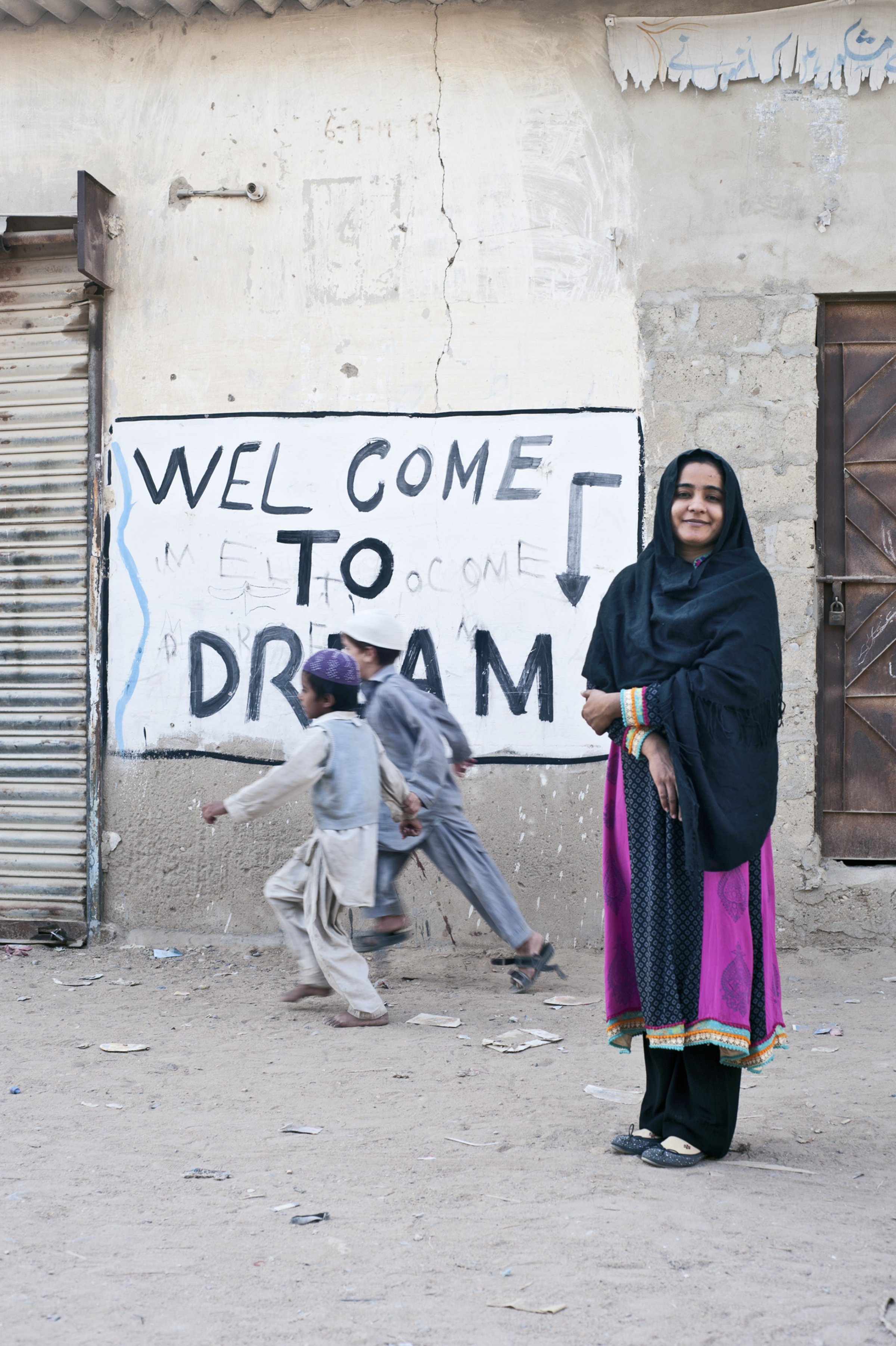
Humaira Bachal always dreamed of flaunting her stellar report cards to her father. “All I wanted was to show him that I was top in mathematics,” says the Pakistani women’s-education activist, her dark brown eyes brimming for a few seconds. “But I never could.”
Bachal’s father, a devout Muslim, came from a family in which women were rarely allowed outside the home, even when seriously unwell. An illiterate lorry driver, he abhorred the fact that his eldest daughter attended school, thinking she’d never find a husband, and expressed his feelings through his fists. “My father was my greatest opponent,” she says. But Bachal, now 26, did go to school and much more besides. Today, she runs the Dream Foundation’s Model Street School for the boys and girls of Moach Goth, the impoverished settlement where she still lives, at the edge of Karachi, Pakistan’s biggest city.
At first Bachal and her three cousins taught local waifs in her cramped living room. Step by step, they upgraded facilities and premises by entreating local philanthropists for donations and urging former pupils to serve as teachers. The school now boasts 34 staff and 1,200 pupils in a gleaming $25,000 three-story building that opened in August, funded partly through pop megastar Madonna’s Ray of Light Foundation. Students learn math, Urdu and English. There are spanking-new computer and science labs plus a spacious art studio. Children are charged 1¢ per day.
Moach Goth residents eke out a hardscrabble existence. The main access road is flanked by the gang-riven ghetto of Lyari on one side and the ramshackle “mosquito colony” on crudely reclaimed mangrove on the other. Rubble fills the street, an acrid pall of dust and jet-black smoke charring the lungs. The foremost trade is hauling goods by donkey cart. A good day may proffer a few dollars; a bad, nothing. Education is a luxury few can afford.
Bachal has changed that, although simply educating herself was a momentous achievement. To escape her father’s ire, she would stash her school uniform at a friend’s house. When he went to work, she would nip over, get changed and sprint to class. School was paid for with pennies earned helping her mother collect and bundle firewood.
Then tragedy struck. Bachal’s 1-year-old cousin died minutes after being given out-of-date medicine—his mother couldn’t read the expiry date on the bottle. Illiteracy cost Bachal’s cousin his life, but the tragedy was an epiphany for her: “I made up my mind the children of the area must be educated.”
Bachal began haunting the squat, concrete houses of Moach Goth, working to coax parents to let their children—and especially their daughters—go to school. Many deemed her a troublemaker and demanded she be banished. Bachal tuned out their threats and just kept talking and teaching. Public opinion eventually turned—even Bachal’s father became a convert. “Who would not praise her efforts?” says Nishar Ahmed Khuhro, Sindh province’s minister of education. “We need people coming forward to do this work.”
Pakistan is a desert when it comes to female education. Literacy for women stands at just 26%. (If you use a stricter criterion than just being able to write one’s name, divide that figure in half.) Only 13 million of 32 million girls under 14 are formally enrolled in school. In addition, the Taliban frequently target schools, as illustrated by the horrific attack on a military-run campus in the northern city of Peshawar on Dec. 16, which claimed at least 147 lives, mostly children.
Pakistan’s education system feeds Islamization, as the poorest turn to madrasahs. These institutions are comparatively wealthy, typically funded via Saudi or other overseas benefactors, with free facilities. But the curriculum is largely religious, and a parochial worldview dominates. It’s a vicious cycle in which poverty and zealotry feed each other.
Bachal knows this only too well. After completing high school she studied at a madrasah for a degree in Islamic studies, donning a “head to heel” burqa and gloves for classes. But she was unable to reconcile her teachers preaching for the subjugation of women with what she read in the scriptures—tales of the Prophet Muhammad’s wives who would compose poetry and conduct business. She quit six months before graduation. “Women don’t need burqas,” says Bachal, who married a childhood friend in late 2014. “If a man looks at me with bad intentions, I can smash him in the face—let him know I’m equal to men.”
The perils of espousing such views in Pakistan are starkly illustrated by Malala Yousafzai, the 17-year-old female-education advocate and Nobel Peace Prize winner who miraculously survived getting shot in the head by the Taliban in October 2012. Like Malala, Bachal isn’t afraid. “If they kill me, I would have sacrificed for my people,” she says. “They will have achieved nothing as there are now many like me.”
She means girls like Bakhtawar Muhammad Hanif, 16, who wants to join Pakistan’s elite Criminal Investigation Department (CID) after she graduates from the Dream Foundation school. “There’s lots of crime in our society, so if I become CID I can do a little bit to address that,” says Bakhtawar. Yet another young Pakistani woman fighting for her dream.
More Must-Reads from TIME
- Inside Elon Musk’s War on Washington
- Meet the 2025 Women of the Year
- The Harsh Truth About Disability Inclusion
- Why Do More Young Adults Have Cancer?
- Colman Domingo Leads With Radical Love
- How to Get Better at Doing Things Alone
- Cecily Strong on Goober the Clown
- Column: The Rise of America’s Broligarchy
Write to Charlie Campbell / Moach Goth at charlie.campbell@time.com